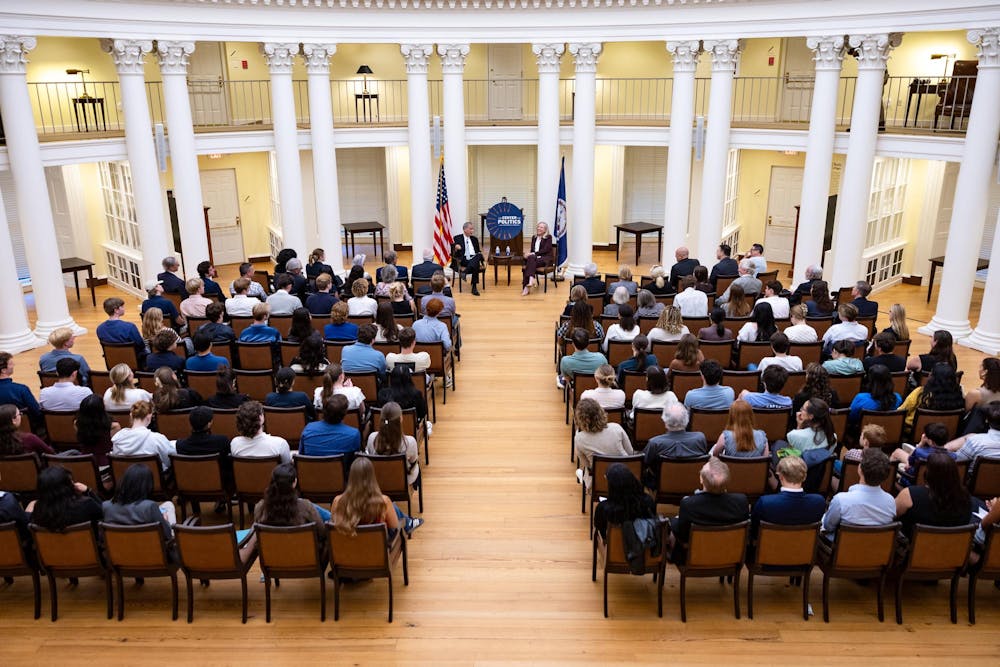Election Day Nov. 4 brought a blue wave that swept the Commonwealth, leaving the executive branch entirely in the Democrats’ hands and solidifying the party’s majority in the General Assembly. Going into the new year, Gov.-elect Abigail Spanberger’s platform of affordability appears both widely popular and legislatively unobstructed. However, it is important to remember that Virginia is a purple state — a status which makes the success of a moderate Democrat like Spanberger both unsurprising and dependent on moderate governance. This is particularly important for Virginia’s public universities which have, in the past four years under Gov. Glenn Youngkin, been roiled with tumult and partisanship. Spanberger, in contrast, must recognize the importance of moderation, which uplifts, not denigrates, the institutional autonomy of universities like our own.
When Youngkin was elected, he entered into a situation of divided governance, a situation which would persist throughout his four-year term. This division did not leave him with much legislative freedom. In fact, it could be argued that a key part of his legacy as he leaves office is the unprecedented number of legislative vetoes he issued. In the absence of a supportive legislature, Youngkin found other ways to advance his core policies. During his campaign, Youngkin foregrounded parental concerns in and the politicization of education policy, such as critical race theory. While a divided legislature made parts of his agenda untenable, he was able to make unilateral changes to higher education in Virginia. As Spanberger begins to enter her own term, Youngkin leaves his term embroiled in controversy with the Virginia General Assembly over the institutional stability and autonomy of higher education.
When Spanberger enters office, one of the largest responsibilities she will undertake is appointing new members to university governance boards — an area where the institutional autonomy and stability of the University has increasingly been threatened. During his term, Youngkin appointed 17 Republican-donating Board of Visitors members to the University along strong partisan lines and often through dubious legal processes. It is worth noting that Youngkin is not the first governor to appoint members of his own parties to the University Board. However, his term did uniquely encapsulate the fragility of the entire appointment system. As such, it is incumbent on Spanberger to reform the appointment process to ensure that no future governor can make unanimous political decisions regarding Board membership.
Spanberger has previously said that the Board members should be chosen by an independent commission instead of a partisan Governor. This is an admirable approach and would tangibly ensure that institutions themselves can function without being guided by partisanship. Of course, implementing a system like this will take time, and Spanberger has numerous vacancies on universities’ boards which must first be remedied. However, until an independent commission can be fully instituted, Spanberger must be conscientious in not embracing a tit for tat approach to governing board appointments. Filling existing vacancies on university boards is a moment for Spanberger to transcend the retributional and partisan politics of Youngkin’s term.
Beyond appointments, Youngkin’s term destabilized our University’s institutional autonomy in other ways. Notably, he embraced both a domineering and apathetic style of leadership — a contradictory and unpredictable path which Spanberger must take care not to replicate. When members of the University community stressed over what effect the abolition of the Office of Diversity, Equity and Inclusion at the University might have on their identitarian expression, Youngkin took to public media to exuberantly celebrate. Even more shocking are accusations from former University President Jim Ryan that the Board’s resolution to abolish diversity, equity and inclusion practices was prescribed by the governor’s office, a gross invasion of institutional independence. As Spanberger enters the Governor’s Mansion, she must avoid rhetorically using our University as a partisan tool.
In a recent display of her thoughtful calculations interacting with higher education, Spanberger sent a letter to the Board asking them to delay the appointment of the new president. She discussed the community’s lack of confidence in the Board and the Board’s lack of statutory compliance — two phenomenon that fundamentally undermine the presidential search process. While Youngkin has argued that her letter was a pre-emptive seizure of power, it actually represents a thoughtfulness and deliberateness which has been missing for four years. Although Spanberger has not yet been sworn into her position as governor, this letter clarified her intention to prioritize stability-focused intervention in higher education conducted with moderation — an involvement necessary for our University.
In her speech on election night, Spanberger established that Virginians selected her in the spirit of “pragmatism over partisanship.” Such pragmatism should continue to be the guiding principle behind her policymaking going forward. As she takes office next year, we urge her to embrace moderation and repair in order to leave the Commonwealth — and our University — in better circumstances than the past four years.
The Cavalier Daily Editorial Board is composed of the Executive Editor, the Editor-in-Chief, the two Opinion Editors, two Senior Associates and an Opinion Columnist. The board can be reached at eb@cavalierdaily.com.







